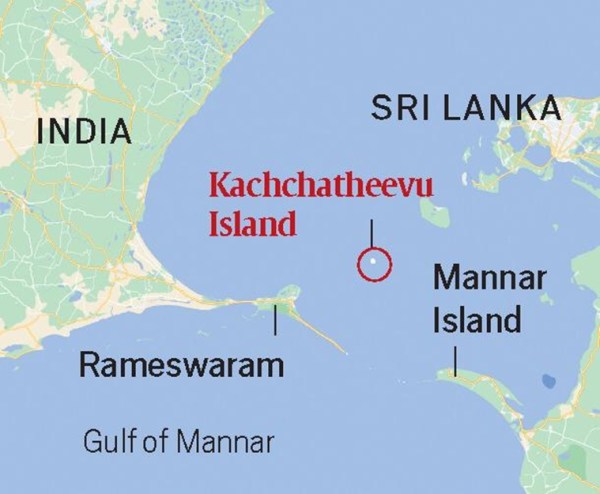- Katchatheevu has become a symbol of historical conflict, political strife, and a reminder of difficult geopolitical decisions.
- The Prime Minister’s use of Katchatheevu during a parliamentary debate fueled continuing debate about this small island tucked between Tamil Nadu and Sri Lanka.

The History of Katchatheevu Island
- Colonial Influence: Katchatheevu, a 285-acre island, was formed by a volcanic explosion in the 14th century. It was traditionally ruled by the Jaffna monarchy of Sri Lanka and, later, the Ramnad Zamindari of India.
- British-era claims: In the early twentieth century, both India and Sri Lanka claimed Katchatheevu to set fishing boundaries. Even throughout the British Raj, the ownership controversy persisted.
Landmark Decision in the 1974 Indo-Sri Lankan Maritime accord:
- Indira Gandhi’s government chose to give Katchatheevu to Sri Lanka as part of the 1974 accord aimed at establishing maritime borders.
- Political Implications: The judgement sparked outrage in Tamil Nadu, where residents criticised the lack of engagement with the state assembly and the impact on traditional fishing rights.
- Ambiguity in Fishing Rights: Although the agreement granted Indian fishermen access to Katchatheevu “hitherto,” fishing rights remained vague, resulting in disputes.
Sri Lankan Civil War and Beyond Civil War Dynamics:
- As Sri Lanka’s naval forces dealt with domestic unrest, the attention switched away from the Katchatheevu issue.
- After the civil war, Sri Lanka strengthened its marine defences, resulting to the arrest of Indian fishermen who ventured into their waters, reigniting calls for Katchatheevu’s return.
Persistent Concerns in Tamil Nadu
- Political Reaction: Tamil Nadu lawmakers from all parties objected to relinquishing Katchatheevu without state assembly approval, citing historical links and economic implications.
- Legal squabbles: The AIADMK of late J Jayalalitha filed petitions challenging the 1974 accord, claiming it violated customary fishing rights. The Union government’s position, however, remained unchanged.
- Position of the Modi government: Despite strong protests from Tamil lawmakers, the Modi government maintained that the island’s status was finalised in 1974 and that regaining it would necessitate extreme actions.
The Implications for Today
- Katchatheevu represents regional and sovereignty concerns, illustrating tensions between Tamil Nadu’s interests and decisions made by the central government.
- Geopolitical Dilemma: In the context of bilateral ties, the case demonstrates the delicate balance between historical claims, political sentiments, and international accords.
Source: https://indianexpress.com/article/explained/explained-politics/pm-modi-katchatheevu-tamil-nadu-8887679/#:~:text=Prime%20Minister%20Narendra%20Modi%2C%20in,to%20Sri%20Lanka%20in%201974.
